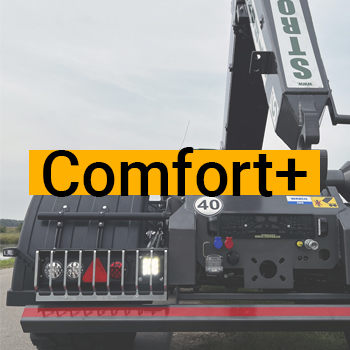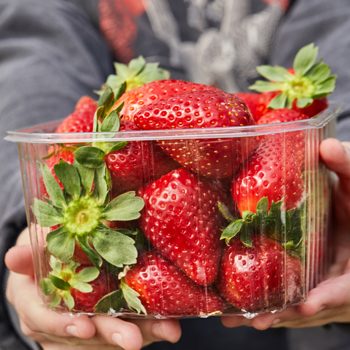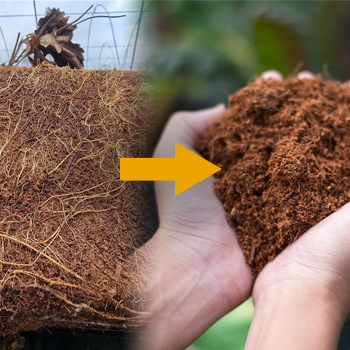Importance of Sterilising Seeding Trays
Seed trays, plant propagators, pallets, flats and in vessel pots are all indispensable tools in a greenhouse growing operation. Using sterile trays and pots as part of a growing cycle is an essential step in ensuring a smooth and quality-assured operation, resulting in the highest hygiene standards and reliable produce for commercial greenhouse operators.
These trays, flats, pallets and containers can be expensive and are considered a significant investment in most greenhouses. The ability to reuse them by employing Stronga’s hygienic protocol system can reduce risks of disease, spoilt crops and reduced yields, saving expenses and reducing harmful environmental costs.

Avoidance of Cross-Contamination
Once greenhouse growers finish a growing cycle, appropriate cleaning processes should take place before the next cycle begins. This ensures the avoidance of cross-contamination and the transmission of pathogens and pests which would affect the quality of the next cycle, leading to waste, a multitude of costs and environmental effects. Cross contamination causes needless avoidable losses; having the right hygiene protocol in place can reduce labour, maximise crop performance and eradicate huge outlays of production materials.

Some of the plant diseases wreaking havoc on greenhouse operations, such as water moulds and Rhizoctonia Solani, are spread through fragment scattering. Spread can be easily prevented with a well-proven steam heat treatment process. However, instead of risking contamination between crops and soils, growers often reduce their produce yield and focus on one variety of seed, restricting their profits and actually increasing the risks associated with their reduced growing operation. Less seeds to start out with will already result in less produce, without accounting for the chance of disease and infestation wiping out this reduced operation entirely.
Sterilizing growing medium and sanitising seed pots, trays and growing equipment is a vital part of the growing cycle. It is a process that the technical team here at Stronga believe greenhouse operators should regard very highly given the arguments outlined in this article. Stronga’s FlowSteama in-vessel heat treatment system offers a modern alternative to a trusted practise dating all the way back to 1888. FlowSteama enables the freedom of choice to recycle and reuse growing equipment and / or substrate with minimal limitations.

Why Chemical Sterilisation is No Longer Viable for Growers
Organic material and debris from soil and plant fragments tends to cling to trays and other tools. The substrate and growing equipment (trays/pots/flats) need to be cleaned and sanitized before they are used and chemicals have been the way to do this in the recent past. This chemical, manual cleaning process, however, is becoming increasingly denounced in the growing community, not only because more of the chemicals are becoming banned but also because it has recently been proven as an unreliable sanitation method which has more flaws than advantages.

Chemical Sterilization – An Inefficient Use of Time & Resource
Chemical use is being gradually phased out as commercial greenhouse operators are realising the lack of efficiency in a process which causes lengthy delays to their operations. To explain, once legal chemical pesticides have been sourced, tests then need to be carried out on the crop to ensure they are able to endure the strength of the selected chemicals. This is an inefficient use of time and a waste of valuable produce. Even when testing has been completed, the grower then suffers further delays due to the need for aeration after application and the tedious, mundane and hazardous task of dipping or spraying each individual tray, crate, pot or pallet.

Not only is the chemical cleaning process lengthy, delaying productivity by 4-10 days due to the aeration process, it is also more expensive, less effective and comes with heath concerns for humans, plants and biological crop. Kenneth Baker highlights in his guide on container-grown plants that, ‘steam is effective against all organisms except a few types of weed seed; methyl bromide is only partially effective against Verticillium, and leaves a residue toxic to some plants; chloropicrin is generally effective against organisms except those in root masses’.
Baker also advises the use of a gas mask and appropriate clothing protection when using chemicals, recommending no use of chemical sterilisation in an enclosed space, making the use of chemical sprays on grower trays within greenhouses more complicated, labour intensive and riskier, in both outcome and procedure. Baker also advises that the cost of chemical treatment is between 1.9 to 3.2 pence per cubic foot, excluding labour costs and that steam operations, which includes the cost of the boiler, is less than 2 pence per cubic foot. Steaming is the better, greener and more cost-efficient method of pasteurising both growing media, seeding trays, plant propagators and more.

Another approach employed by some growers, but to a lesser extent, involves washing trays using pressure washing tools, however this has also proven unreliable and relies heavily on the operator’s accuracy and diligence. Results can be varied and there is no guarantee of complete pasteurisation - a risk that does not occur with FlowSteama which offers a fully evidenced, user-controlled steam pasteurisation process.
Automation is here; gone are the days where labour-intensive sanitisation approaches are adopted using foaming cleansers, brushing trays, soaking and chemically-spraying infected trays and substrates.

Clean Steam = Cleaner Pasteurisation = Cleaner Produce
Instead of risking the health of operators and plants whilst wasting valuable labour time and produce – we believe growers should invest in our well-proven steam-treatment systems to reuse substrate again within an hour of pasteurisation.
Unlike the chemical sterilisation of propagation trays, crates, stacking containers and plastic dollies, steam reduces labour whilst containing all the cleaning in one place - the FlowSteama vessel. There is no need for drying and aeration time and by using steam only, the whole process is overall, far ‘cleaner’. The properties of chemical cleaners are often toxic to plants and surrounding living organisms and plants. Due to the ‘stripping’ nature of chemicals, they also result in chemical residues being left on trays which in turn can impact the flavour and quality of the grown produce. Steaming is the organic alternative to pasteurising soils and trays.

Rhizoctonia is a common fungus that grows in the corner joints of flats. Due to the encompassing, holistic nature of steam pasteurisation, there are no inaccessible areas; the grower can be confident that the whole tray / pot will be fully sanitised. This has led many tray suppliers to recommend the utilisation of steam pasteurisation methods instead of chemical. Learn why…
Key Benefits of the Steam-Cleaning
● A more organic approach with no need to test the chemical tolerance on plants and crops.
● Less risks – no contact issues where chemicals come into contact with an intolerant plant.
● No costly delays – full steam pasteurisation occurs in the FlowSteama vessel within 30 minutes.
● Whilst also providing prompt, high quality results, you can use your pasteurised growing substrate and equipment almost immediately.
● Less material and labour costs – no soaking, hand-weeding, drying or washing necessary.
● Minimal exposure and risk to human and plant health.
● No harmful residues left on trays, pots and pallets.

You’re Not Just Buying Steam Pasteurisation
Stronga’s FlowSteama system is the most reliable and well proven steam heat treatment solution available in the market with multiple units in use across the globe. By using super-heated steam from the adjoining SteamBoila, FlowSteama ensures that propagation trays, crates and pots are cleaned in their entirety with absolutely no waste of steam or energy.
The design of the FlowSteama vessel allows the grower to pasteurise multiple trays, crates and pots at once, thoroughly, helping to promote a ‘cleaner’ growing operation with optimised hygiene and healthier produce.

FlowSteama Heat Treatment…
● Low pressure, superheated steam is fast moving and extremely effective at pasteurising the whole load – be that propagation equipment or contaminated growing substrate.
● “Clean side” – “dirty side” system ensures absolutely no contamination between used and pasteurised equipment.
● Steam pasteurisation is contained in the sealed vessel and no drying is required post processing.
● The smart control system enables clients to take full control over floor strokes settings and monitor temperature readings – this allows precision sanitisation time which can be easily modified (flats = 180̊F/82̊C for 30 minutes).
● FlowSteama is available in both ‘Rova’ and ‘Vessa’ models, allowing for mobile or stationary on-site application.

Green Today. Greener Tomorrow.
After the steam pasteurisation of both growing substrate and propagation equipment, growers can rest assured that the FlowSteama has provided quick, effective and cost-efficient pasteurisation, allowing them to reuse their growing equipment immediately after. The outcome is a more economic and environmentally-friendly greenhouse growing operation.
Stronga advise growers to check that their growing equipment is heat-resistant before steaming – please enquire to discuss your project. Start your journey towards saving time, material and labour costs today – info@stronga.co.uk



Share this post